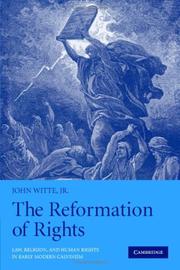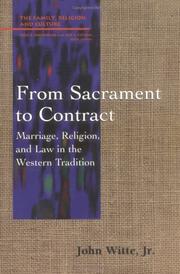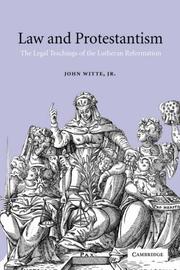| Listing 1 - 10 of 69 | << page >> |
Sort by
|

ISBN: 9780521818421 9780521521611 9780511819377 Year: 2007 Publisher: Cambridge Cambridge University Press
Abstract | Keywords | Export | Availability | Bookmark
 Loading...
Loading...Choose an application
- Reference Manager
- EndNote
- RefWorks (Direct export to RefWorks)
Calvinism --- -Christianity and law --- Christianity and politics --- Church and state --- -Church and state --- -342.72/.73 --- Christianity and state --- Separation of church and state --- State and church --- State, The --- Christianity --- Church and politics --- Politics and Christianity --- Politics and the church --- Political science --- Law and Christianity --- Law --- Law (Theology) --- Reformed Protestantism --- Congregationalism --- Reformation --- Reformed Church --- Theology, Doctrinal --- Arminianism --- Puritans --- Zwinglianism --- History --- Mensenrechten. Amnesty International. Euthanasie --- Political aspects --- Doctrines --- Christian church history --- History of civilization --- History of the law --- History of Europe --- anno 1600-1699 --- anno 1500-1599 --- Calvinists --- Christianity and law --- 342.72/.73 --- Protestants --- Calvinistic Methodists --- 342.72/.73 Mensenrechten. Amnesty International. Euthanasie --- Europe --- United States --- Politics and government. --- Politics and government --- Politics

ISBN: 0664255434 Year: 1997 Publisher: Louisville Westminster/John Knox Press
Abstract | Keywords | Export | Availability | Bookmark
 Loading...
Loading...Choose an application
- Reference Manager
- EndNote
- RefWorks (Direct export to RefWorks)
This book analyzes the historical interplay between Christian theological norms and Western legal principles on family life, particularly in medieval canon law, the Reformation, and the Enlightenment. While it pays attention to social practices, it is primarily a theological analysis which seeks to come to terms with the cardinal religious sources and dimensions of the modern Western marriage law as these are exhibited on the books. Issues to which it pays particular attention are the definition of a family, the role of gender, the role of children, and the role of the church.
348.412.7 --- Marriage (Canon law) --- Marriage --- -Marriage law --- -Law, Marriage --- Domestic relations --- Sex and law --- Husband and wife --- Married life --- Matrimony --- Nuptiality --- Wedlock --- Love --- Sacraments --- Betrothal --- Courtship --- Families --- Home --- Honeymoons --- Sacraments (Canon law) --- Canoniek zakenrecht: huwelijk--(canon 1012-1143) --- Religious aspects --- -Christianity --- Law and legislation --- Prohibited degrees --- Catholic Church --- Marriage law --- Religious aspects. --- Christianity. --- -Canoniek zakenrecht: huwelijk--(canon 1012-1143) --- Marriage (Canon law). --- 348.412.7 Canoniek zakenrecht: huwelijk--(canon 1012-1143) --- -Marriage (Canon law) --- Law, Marriage --- Religious aspects&delete& --- Christanity

ISBN: 0521781329 0521012996 9780521012997 9780521781329 9780511613548 1107120349 0511176546 0511019793 0511157436 0511325576 0511613547 1280429755 0511046014 9780511019791 9780511157431 9780511046018 9786610429752 6610429758 9781107120341 9781280429750 9780511176548 9780511325571 Year: 2002 Publisher: Cambridge New York Cambridge University Press
Abstract | Keywords | Export | Availability | Bookmark
 Loading...
Loading...Choose an application
- Reference Manager
- EndNote
- RefWorks (Direct export to RefWorks)
The Lutheran Reformation of the early sixteenth century brought about immense and far-reaching change in the structures of both church and state, and in both religious and secular ideas. This book investigates the relationship between the law and religious ideology in Luther's Germany, showing how they developed in response to the momentum of Lutheran teachings and influence. Profound changes in the areas of education, politics and marriage were to have long-lasting effects on the Protestant world, inscribed in the legal systems inherited from that period. John Witte, Jr. argues that it is not enough to understand the Reformation either in theological or in legal terms alone but that a perspective is required which takes proper account of both. His book should be essential reading for scholars and students of church history, legal history, Reformation history, and in adjacent areas such as theology, ethics, the law, and history of ideas.
Religion and law --- Reformation --- History. --- Law --- Law and religion --- History --- Religious aspects --- Arts and Humanities --- Religion --- Religion and law - Germany - History. --- Reformation - Germany.
Book
ISBN: 9781107101593 110710159X 9781107499171 1107499178 9781316182031 1316182037 1316310922 1316290298 Year: 2015 Publisher: Cambridge Cambridge University Press
Abstract | Keywords | Export | Availability | Bookmark
 Loading...
Loading...Choose an application
- Reference Manager
- EndNote
- RefWorks (Direct export to RefWorks)
For more than 2,500 years, the Western tradition has embraced monogamous marriage as an essential institution for the flourishing of men and women, parents and children, society and the state. At the same time, polygamy has been considered a serious crime that harms wives and children, correlates with sundry other crimes and abuses, and threatens good citizenship and political stability. The West has thus long punished all manner of plural marriages and denounced the polygamous teachings of selected Jews, Muslims, Anabaptists, Mormons, and others. John Witte, Jr carefully documents the Western case for monogamy over polygamy from antiquity until today. He analyzes the historical claims that polygamy is biblical, natural, and useful alongside modern claims that anti-polygamy laws violate personal and religious freedom. While giving the pro and con arguments a full hearing, Witte concludes that the Western historical case against polygamy remains compelling and urges Western nations to hold the line on monogamy.
Polygamy --- 392.4/.5 <09> --- 392.4/.5 <09> Verloving. Huwelijk. Huwelijksgebruiken. Partnerkeuze. Polyandrie. Polygamie. Monogamie--Geschiedenis van ... --- Verloving. Huwelijk. Huwelijksgebruiken. Partnerkeuze. Polyandrie. Polygamie. Monogamie--Geschiedenis van ... --- Law and legislation. --- Religious aspects. --- Verloving. Huwelijk. Huwelijksgebruiken. Partnerkeuze. Polyandrie. Polygamie. Monogamie--Geschiedenis van --- Law and legislation --- Religious aspects --- Marriage law --- Verloving. Huwelijk. Huwelijksgebruiken. Partnerkeuze. Polyandrie. Polygamie. Monogamie--Geschiedenis van .. --- Verloving. Huwelijk. Huwelijksgebruiken. Partnerkeuze. Polyandrie. Polygamie. Monogamie--Geschiedenis van . --- Polygamy - Law and legislation --- Polygamy - Religious aspects
Book
ISBN: 0295805846 9780295805849 9780295988597 0295988592 9780295992914 0295992913 Year: 2008 Publisher: Seattle
Abstract | Keywords | Export | Availability | Bookmark
 Loading...
Loading...Choose an application
- Reference Manager
- EndNote
- RefWorks (Direct export to RefWorks)
John Witte's poetry sweeps the reader immediately into its crosscurrents, its passionate engagement and its ambivalence. Composed of staggered tercets, the poems in Second Nature track the chaotic rush and swerve of life as we live it. Wide open to the world, Witte writes with uncommon energy and urgency and his vision is exhilarating. Second Nature teems with expertly realized lyrics, monologues, and narratives, as well as poems based on historical figures from Ovid to Janis Joplin. The metaphors for human endurance, and the transformative power of art and community, are accurate and rich. Alert to the dangers of love and loss, Witte finds his poems where sorrow and transcendence converge. Like birds singing their "desperate psalm" in a clear-cut, his poems bring us a rare kind of hope.
Poems. --- Poems --- Poetry --- Verses (Poetry) --- Literature --- Philosophy --- Poetry.
Book
ISBN: 0295805773 9780295805771 9780295994512 0295994517 Year: 2015 Publisher: Seattle
Abstract | Keywords | Export | Availability | Bookmark
 Loading...
Loading...Choose an application
- Reference Manager
- EndNote
- RefWorks (Direct export to RefWorks)
Disquiet is a collection of poems that utilizes natural phenomena-a bright beach, a fallen tree limb, the weight of gravity-to evoke and reflect upon memory and human experience. The poems are structurally innovative, each shaped around a central axis as they trace the speaker's growth from childhood to adulthood. Acute observations resonate throughout the book as its focus shifts from the natural world to the world of the made-the grocery cart or pie-case or microscope-to the world of visual art, and then back. The poems are subtly braided together in a way reminiscent of the invisible bonds that unite snowflakes or cells.
Book
ISBN: 131688693X 1316882543 1316884902 1107184754 9781107184756 9781316882542 9781316636121 Year: 2019 Publisher: Cambridge Cambridge University Press
Abstract | Keywords | Export | Availability | Bookmark
 Loading...
Loading...Choose an application
- Reference Manager
- EndNote
- RefWorks (Direct export to RefWorks)
This book defends the fundamental place of the marital family in modern liberal societies. While applauding modern sexual freedoms, John Witte, Jr also defends the traditional Western teaching that the marital family is an essential cradle of conscience, chrysalis of care, and cornerstone of ordered liberty. He thus urges churches, states, and other social institutions to protect and promote the marital family. He encourages reticent churches to embrace the rights of women and children, as Christians have long taught, and encourages modern states to promote responsible sexual freedom and family relations, as liberals have long said. He counsels modern churches and states to share in family law governance, and to resist recent efforts to privatize, abolish, or radically expand the marital family sphere. Witte also invites fellow citizens to end their bitter battles over same-sex marriage and tend to the vast family field that urgently needs concerted attention and action.
Families --- Marriage --- Married life --- Matrimony --- Nuptiality --- Wedlock --- Love --- Sacraments --- Betrothal --- Courtship --- Home --- Honeymoons --- Family --- Family life --- Family relationships --- Family structure --- Relationships, Family --- Structure, Family --- Social institutions --- Birth order --- Domestic relations --- Households --- Kinship --- Matriarchy --- Parenthood --- Patriarchy --- Religious aspects --- Christianity --- History of doctrines. --- Social aspects --- Social conditions --- Families - Religious aspects - Christianity - History of doctrines. --- Marriage - Religious aspects - Christianity - History of doctrines.

ISBN: 0511819374 0521818427 0521521610 Year: 2007 Publisher: Cambridge : Cambridge University Press,
Abstract | Keywords | Export | Availability | Bookmark
 Loading...
Loading...Choose an application
- Reference Manager
- EndNote
- RefWorks (Direct export to RefWorks)
John Calvin developed arresting new teachings on rights and liberties, church and state, and religion and politics that shaped the law of Protestant lands. Calvin's original teachings were periodically challenged by major crises - the French Wars of Religion, Dutch Revolt, the English Civil War, American colonization, and American Revolution. In each such crisis moment, a major Calvinist figure emerged - Theodore Beza, Johannes Althusius, John Milton, John Winthrop, John Adams, and others - who modernized Calvin's teachings and translated them into dramatic new legal and political reforms. This rendered early modern Calvinism one of the driving engines of Western constitutionalism. A number of basic Western laws on religious and political rights, social and confessional pluralism, federalism and constitutionalism, and more owe a great deal to this religious movement. This book is essential reading for scholars and students of history, law, religion, politics, ethics, human rights, and the Protestant Reformation.
Calvinism --- Calvinists --- Christianity and law --- Christianity and politics --- Church and state --- Religion --- Philosophy & Religion --- Christianity --- Christianity and state --- Separation of church and state --- State and church --- State, The --- Church and politics --- Politics and Christianity --- Politics and the church --- Political science --- Law and Christianity --- Law --- Law (Theology) --- Protestants --- Calvinistic Methodists --- Reformed Protestantism --- Congregationalism --- Reformation --- Reformed Church --- Theology, Doctrinal --- Arminianism --- Puritans --- Zwinglianism --- History --- Political aspects --- Doctrines --- Europe --- United States --- Politics and government. --- Politics and government --- Politics --- Calvinism. --- Christianity and law. --- Christianity and politics. --- History.
Book
ISBN: 1108652840 1108677843 1108678653 1108429203 1108453260 9781108677844 9781108678650 9781108652841 Year: 2022 Publisher: Cambridge : Cambridge University Press,
Abstract | Keywords | Export | Availability | Bookmark
 Loading...
Loading...Choose an application
- Reference Manager
- EndNote
- RefWorks (Direct export to RefWorks)
Leading legal scholar John Witte, Jr. explores the role religion played in the development of rights in the Western legal tradition and traces the complex interplay between human rights and religious freedom norms in modern domestic and international law. He examines how US courts are moving towards greater religious freedom, while recent decisions of the pan-European courts in Strasbourg and Luxembourg have harmed new religious minorities and threatened old religious traditions in Europe. Witte argues that the robust promotion and protection of religious freedom is the best way to protect many other fundamental rights today, even though religious freedom and other fundamental rights sometimes clash and need judicious balancing. He also responds to various modern critics who see human rights as a betrayal of Christianity and religious freedom as a betrayal of human rights.
Human rights. --- Freedom of religion --- Christianity and law. --- Christianity --- Civil rights --- History. --- Influence. --- Religious aspects --- Christianity. --- European Court of Human Rights. --- Magna Carta --- Church and civil rights --- Civil rights (Christian theology) --- Liberation theology --- Law and Christianity --- Law --- Law (Theology) --- Freedom of worship --- Intolerance --- Liberty of religion --- Religious freedom --- Religious liberty --- Separation of church and state --- Freedom of expression --- Liberty --- Basic rights --- Civil rights (International law) --- Human rights --- Rights, Human --- Rights of man --- Human security --- Transitional justice --- Truth commissions --- Law and legislation --- C.E.D.O. --- CEDO --- CEDU --- ECtHR --- Avrupa İnsan Hakları Dîvanı --- Cour européenne des droits de l'homme --- Tribunal Europeo de Derechos del Hombre --- Tribunal Europeo de Derechos Humanos --- Europäischer Gerichtshof für Menschenrechte --- Evropeĭskiĭ Sud po pravam cheloveka --- Европейский Суд по правам человека --- Council of Europe. --- Corte europea dei diritti dell'uomo --- Eurōpaiko Dikastērio Anthrōpinōn Dikaiōmatōn --- Ευρωπαικό Δικαστήριο Ανθρώπινων Δικαιωμάτων --- Curtea Europeană a Drepturilor Omului --- Europejski Trybunał Praw Człowieka --- Avrupa İnsan Hakları Mahkemesi --- Evropský soud pro lidská práva --- I︠E︡vropeĭsʹkyĭ Sud z prav li︠u︡dyny --- Європейський Суд з прав людини --- Evropeĭski sŭd po pravata na choveka --- Европейски съд по правата на човека --- Europos Žmogaus teisių teismas --- Mardu iravunkʻneri evropakan dataran --- İnsan Hakları Avrupa Mahkemesi --- Evropski sud za ljudska prava --- Европски суд за људска права --- AİHM --- Gjykata Europiane për të Drejtat e Njeriut --- GJEDNJ --- EGMR --- Euroopa Inimõiguste Kohus --- European Commission of Human Rights --- Magna Charta --- Magna carta regis Johannis, XV die junii, MCCXV, anno regni XVII --- Velikai︠a︡ Khartīi︠a︡ Volʹnosteĭ --- Magŭna Kʻarŭtʻa
Book
ISBN: 9004536574 9004681450 9789004681453 9789004536579 Year: 2023 Publisher: Leiden, The Netherlands : Koninklijke Brill NV,
Abstract | Keywords | Export | Availability | Bookmark
 Loading...
Loading...Choose an application
- Reference Manager
- EndNote
- RefWorks (Direct export to RefWorks)
John Witte offers sage reflections on how to thrive in law school; short commentaries on hard questions of faith, freedom, and family; pithy sermons on difficult biblical texts on law; and touching tributes to a few of his fallen heroes.
| Listing 1 - 10 of 69 | << page >> |
Sort by
|

 Search
Search Feedback
Feedback About UniCat
About UniCat  Help
Help News
News